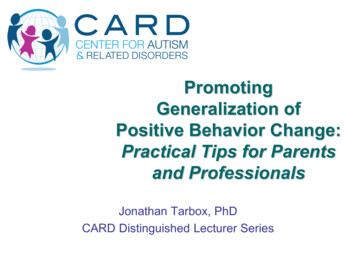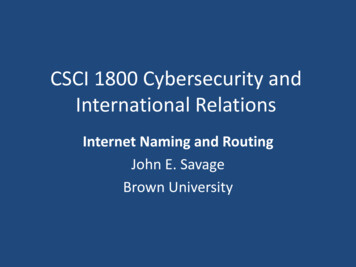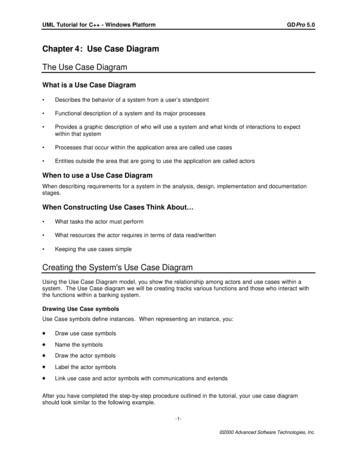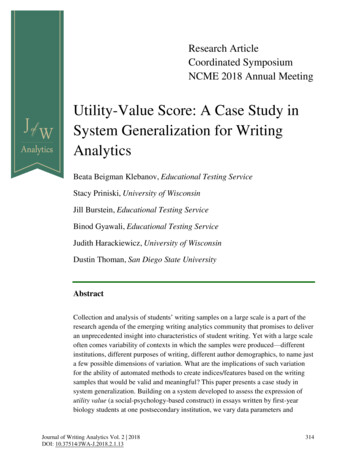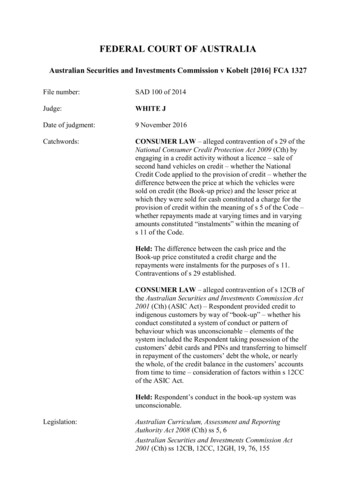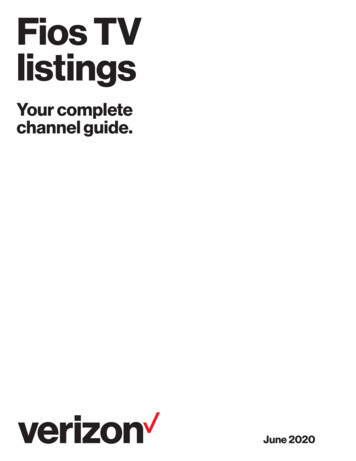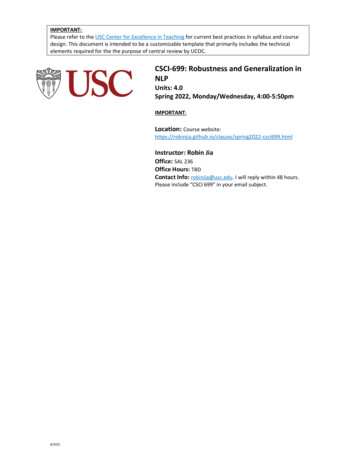
Transcription
IMPORTANT:Please refer to the USC Center for Excellence in Teaching for current best practices in syllabus and coursedesign. This document is intended to be a customizable template that primarily includes the technicalelements required for the the purpose of central review by UCOC.CSCI-699: Robustness and Generalization inNLPUnits: 4.0Spring 2022, Monday/Wednesday, 4:00-5:50pmIMPORTANT:Location: Course 022-csci699.htmlInstructor: Robin JiaOffice: SAL 236Office Hours: TBDContact Info: robinjia@usc.edu. I will reply within 48 hours.Please include “CSCI 699” in your email subject.8/2021
Course DescriptionIn natural language processing (NLP), we set out to solve language-related tasks (e.g., machine translation,question answering) but often evaluate on narrow, in-distribution test datasets. With recent advances indeep learning, modern systems have achieved high accuracy on many canonical datasets, but still seem farfrom solving general tasks. In this class, we will survey recent research on robustness and generalizationthat studies this gap between in-distribution accuracy and task competency through out-of-distirbutionsettings. We will learn about different settings in which NLP systems often fail to generalize well, includingadversarial perturbations, settings that require compositional reasoning, and domain transfer. We will alsolearn about how average accuracy can mask disparate performance across subpopulations, and how thiscan lead to undesirable consequences. Across these topics, we will cover methods both for measuring theserobustness and generalization issues and ways that we can improve model robustness and generalization.Learning ObjectivesStudents should come away with a broad understanding of the generalization challenges needed for NLPsystems and how current research is attempting to solve these challenges. Taking this class will preparestudents for research or other applied work in NLP and/or robustness. Students will get weekly practiceanalyzing and discussing current research papers.Prerequisite(s): Familiarity with natural language processing and/or machine learning. Ideal pre/corequisites are CSCI 544 (Applied Natural Language Processing) or CSCI 567 (Machine Learning). Email me ifyou want to enroll but are unsure if you meet the prerequisites.Course NotesGrading type: Letter of Credit/No CreditRequired Readings and Supplementary MaterialsAll required readings will be provided in PDF form. Optional recommended readings include: Lena Voita, “NLP Course For You.” This is an excellent, relatively short introduction to modern NLP.I recommend starting here if you do not have prior NLP experience. Jurafsky and Martin, “Speech and Language Processing.” This is my main recommendation for acomprehensive NLP textbook. The new 3rd edition is the most up-to-date NLP textbook available. Eisenstein. “Natural Language Processing.” Some students may prefer this textbook. It focusesmore on the machine learning and mathematical aspects of NLP. Barocas, Hardt, and Narayanan. “Fairness and Machine Learning: Limitations and Opportunities.”For more about fairness and machine learning.Description and Assessment of AssignmentsGrades will be based on paper presentations (30%), discussion (10%), and a final project (60% total).Paper presentations (30%)Students will be expected to present 1-2 research papers and lead class discussion on these papers. Thepresentation should help everyone in the class understand these papers as well as relevant backgroundmaterial. The presenter should also prepare a few discussion questions to encourage discussion after thepresentation.Paper discussion participation (10%)Students are expected to participate in class discussions. This includes asking questions duringpresentations as well as voicing opinions on discussion topics.Final project (60% total)Page 2
Students must individually complete a final research project on a topic related to the class. This project isexpected to include novel research on either (1) evaluation methodology for identifying problems withmodels related to robustness, generalization, or fairness, or (2) modeling innovations for improvingrobustness, generalization, fairness, or other related aspects of model behavior. Please come to officehours or email me if you have questions related to choosing a project direction.All written assignments related to the final project should use the standard *ACL paper submissiontemplate.Project proposal (5%). Students should submit a 2-page proposal for their project by the end of Week 5.The proposal should describe the goal of the project and include a survey of related work.Project progress report (10%). Students should submit a 5-page progress report for their project by theend of Week 10. This should once again describe the project’s goals (which may have changed since theproposal), initial results, and a concrete plan of what will be done for the final report. While the initialresults need not be positive, students are expected to have made non-trivial implementation progress bythis point.Project final presentation (20%). This will be a 20-30 minute presentation during the last two weeks ofclass. Students should describe the motivation for their work, relevant background material, and results. Iencourage students to present both positive and negative results. There will also be some time for audiencequestions.Project final report (25%). Students should submit a 8-page final report detailing all aspects of theirproject. The report should be structured like a conference paper, including an abstract, introduction,related work, and experiments. Parts of the proposal and progress report may be reused for the finalreport. Negative results will not be penalized, but should be accompanied with detailed analysis of why theproposed method did not work as anticipated.Page 3
Grading BreakdownAssessment Tool (assignments)Paper PresentationsClass ParticipationProject proposalProject progress reportProject final presentationProject final reportTOTAL% of Grade30105102025100Grading ScaleCourse final grades will be determined using the following scaleA95-100A90-94B 87-89B83-86B80-82C 77-79C73-76C70-72D 67-69D63-66D60-62F59 and belowAssignment Submission PolicyAssignments should be submitted by email before 11:59pm on the due date.Grading TimelineAssignments will be graded within one week of submissionAdditional PoliciesYou are given 4 late days to use for the project proposal and progress report (no late days for the finalreport), to be used in integer amounts and distributed as you see fit. Additional late days will result in adeduction of 10% of the grade on the corresponding assignment per day.Page 4
Course Schedule: A Weekly BreakdownTopics/Daily ActivitiesWeek 1Week 2Week 3Week 4Week 5Week 6Week 7Week 8Week 9Week 10Adversarialperturbations, adversarialtriggersModel stealing, datapoisoning; Introduction todomain adaptationDomain-adaptivepretraining, fairgeneralization, empiricaltrendsSpurious correlations,dataset biasesAvoiding spuriouscorrelations at trainingtimeCounterfactual dataaugmentation; Fairness inMLBias in NLP modelsWeek 14Week 15Project presentationsFINALN/AWeek 12Week 13DeliverablesIntroduction; The TuringTestAdversarial examplesDistributionally robustoptimization, biasamplificationCompositionality andsystematicityImproving compositionalgeneralization;Adversarial datacollectionAdversarial filtering;ConclusionProject presentationsWeek 11Readings/PreparationProject proposal due by Feb. 11 at11:59pm PSTProject progress report due byMarch 25 at 11:59pm PSTProject final report due by May 6at 11:59pm PSTPage 5
Statement on Academic Conduct and Support SystemsAcademic Conduct:Plagiarism – presenting someone else’s ideas as your own, either verbatim or recast in your own words – isa serious academic offense with serious consequences. Please familiarize yourself with the discussion ofplagiarism in SCampus in Part B, Section 11, “Behavior Violating University Standards”policy.usc.edu/scampus-part-b. Other forms of academic dishonesty are equally unacceptable. Seeadditional information in SCampus and university policies on Research and Scholarship Misconduct.Students and Disability Accommodations:USC welcomes students with disabilities into all of the University’s educational programs. The Office ofStudent Accessibility Services (OSAS) is responsible for the determination of appropriate accommodationsfor students who encounter disability-related barriers. Once a student has completed the OSAS process(registration, initial appointment, and submitted documentation) and accommodations are determined tobe reasonable and appropriate, a Letter of Accommodation (LOA) will be available to generate for eachcourse. The LOA must be given to each course instructor by the student and followed up with a discussion.This should be done as early in the semester as possible as accommodations are not retroactive. Moreinformation can be found at osas.usc.edu. You may contact OSAS at (213) 740-0776 or via email atosasfrontdesk@usc.edu.Support Systems:Counseling and Mental Health - (213) 740-9355 – 24/7 on callstudenthealth.usc.edu/counselingFree and confidential mental health treatment for students, including short-term psychotherapy, groupcounseling, stress fitness workshops, and crisis intervention.National Suicide Prevention Lifeline - 1 (800) 273-8255 – 24/7 on callsuicidepreventionlifeline.orgFree and confidential emotional support to people in suicidal crisis or emotional distress 24 hours a day, 7days a week.Relationship and Sexual Violence Prevention Services (RSVP) - (213) 740-9355(WELL), press “0” after hours –24/7 on callstudenthealth.usc.edu/sexual-assaultFree and confidential therapy services, workshops, and training for situations related to gender-basedharm.Office for Equity, Equal Opportunity, and Title IX (EEO-TIX) - (213) 740-5086eeotix.usc.eduInformation about how to get help or help someone affected by harassment or discrimination, rights ofprotected classes, reporting options, and additional resources for students, faculty, staff, visitors, andapplicants.Reporting Incidents of Bias or Harassment - (213) 740-5086 or (213) 821-8298usc-advocate.symplicity.com/care reportAvenue to report incidents of bias, hate crimes, and microaggressions to the Office for Equity, EqualOpportunity, and Title for appropriate investigation, supportive measures, and response.The Office of Student Accessibility Services (OSAS) - (213) 740-0776osas.usc.eduOSAS ensures equal access for students with disabilities through providing academic accommodations andauxiliary aids in accordance with federal laws and university policy.Page 6
USC Campus Support and Intervention - (213) 821-4710campussupport.usc.eduAssists students and families in resolving complex personal, financial, and academic issues adverselyaffecting their success as a student.Diversity, Equity and Inclusion - (213) 740-2101diversity.usc.eduInformation on events, programs and training, the Provost’s Diversity and Inclusion Council, DiversityLiaisons for each academic school, chronology, participation, and various resources for students.USC Emergency - UPC: (213) 740-4321, HSC: (323) 442-1000 – 24/7 on calldps.usc.edu, emergency.usc.eduEmergency assistance and avenue to report a crime. Latest updates regarding safety, including ways inwhich instruction will be continued if an officially declared emergency makes travel to campus infeasible.USC Department of Public Safety - UPC: (213) 740-6000, HSC: (323) 442-120 – 24/7 on calldps.usc.eduNon-emergency assistance or information.Office of the Ombuds - (213) 821-9556 (UPC) / (323-442-0382 (HSC)ombuds.usc.eduA safe and confidential place to share your USC-related issues with a University Ombuds who will work withyou to explore options or paths to manage your concern.Occupational Therapy Faculty Practice - (323) 442-3340 or otfp@med.usc.educhan.usc.edu/otfpConfidential Lifestyle Redesign services for USC students to support health promoting habits and routinesthat enhance quality of life and academic performance.Page 7
Required Readings and Supplementary Materials All required readings will be provided in PDF form. Optional recommended readings include: Lena Voita, “NLP Course For You.” This is an excellent, relatively short introduction to modern NLP. I recommend starting here
